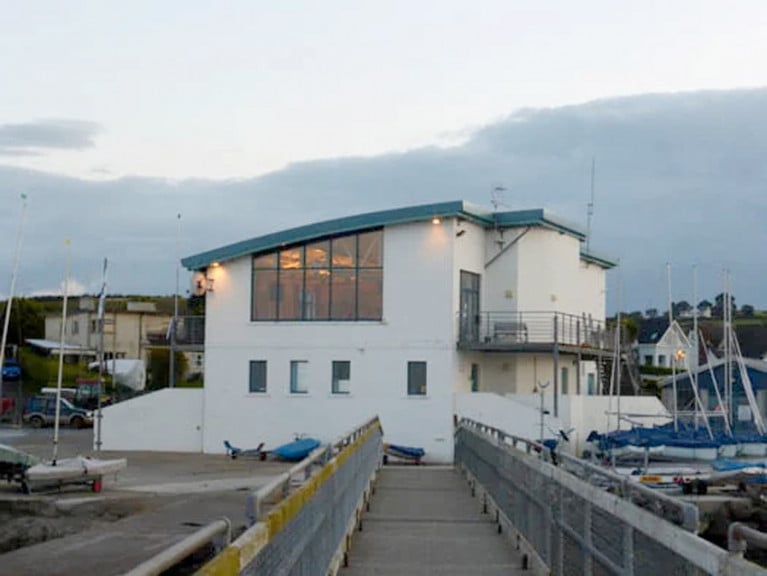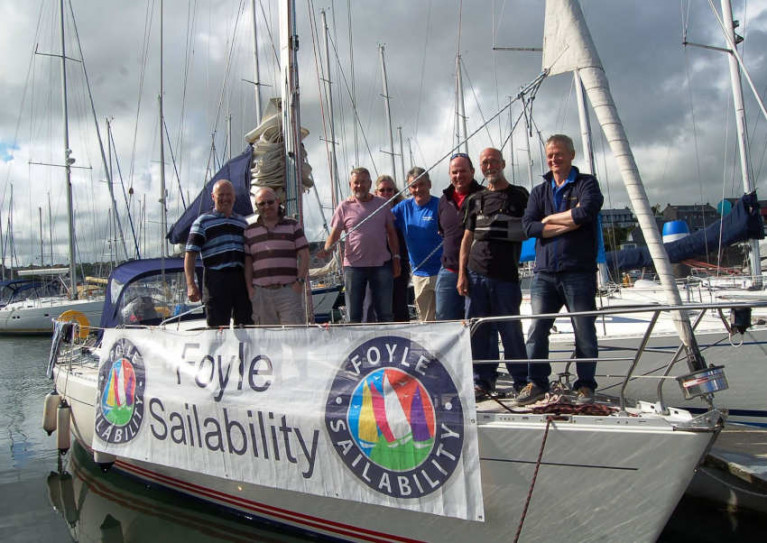Displaying items by tag: Recognition 2020
RYANI Recognises Strangford Lough Yacht Club for Volunteers’ Tireless Efforts Ensuring Safe Return to Water
The second club to be celebrated in RYANI’s Recognition 2020 initiative is Strangford Lough Yacht Club, whose volunteers jumped into action to ensure the club was safe and ‘Covid-ready’ for when everyone could get back on the water.
The club was originally due to open its season at the beginning of May, but with coronavirus restrictions in place across Northern Ireland this wasn’t possible.
Instead, the club’s most dedicated volunteers set about getting safety measures in place for whenever they could open.
Some of the first measures SLYC put into place were hand sanitising stations throughout the club and its grounds. In the early stages a slipway booking system was implemented so the club could control how many individuals were in the club grounds at any one time.
Communication with members was key and there was frequent guidance issued by the club.
A craning team spent a lot of time overseeing the craning in of over 30 boats, which meant that by late May and early June many members and their families were able to safely enjoy cruising on Strangford Lough.
In July, restrictions were eased further and sailing training was permitted — a very important part of the club.
Committee members and instructors worked hard to ensure the club was in a position to safely deliver sailing courses, giving younger people (both members and non-members) the opportunity to take part in water activities in a safe environment while developing their sailing skills.
Club racing also commenced in July, with representatives from all classes getting on the water — providing a much needed sense of normality in very uncertain times.
September saw the return of SLYC’s most popular sailing series, the Frostie. Sailors from all across Strangford Lough eagerly travelled to Whiterock to take part in this annual series.
‘Despite the uncertainty that we all found ourselves in, the determination of many individuals was phenomenal and humbling’
With over 40 boats entered, it was one of the largest entries the club had ever seen and with strict safety procedures in place, it was also one of the most successful.
As the Frostie series came to an end, Covid restrictions came back into play. The craning team were once again working round-the-clock and in difficult weather conditions, ensuring that every boat was successfully recovered.
SLYC senior instructor Jack Kennedy said: “As soon as we were aware that Covid was going to affect things at the club, we took action straight away to get measures in place.”
He added: “Looking back at this year, despite constantly changing restrictions, SLYC delivered a very popular sailing event, training, club racing and cruising to its members and visitors. This was as a result of a fantastic team effort from both the Commodore’s Committee and the general membership of the Club.
“Despite the uncertainty that we all found ourselves in, the determination of many individuals was phenomenal and humbling.
“One of the most fantastic things about this sporting activity is the volunteers it has. So many individuals give both their time and expertise and this year it was needed even more.
“At SLYC, we hope that 2021 brings more normality and that we are able to be fully functional again, hosting sailing events, social events, club racing and training.”
RYANI chief operating officer Richard Honeyford said: “Volunteers at SLYC worked extremely hard to ensure that all measures were taken to ensure the club was safe for members to return to the club and the water.
“While it has been a particularly difficult time for everyone in our sailing and boating community, it is both heartwarming and inspiring to see the dedication and innovative ways our volunteers work.
“I commend SLYC for their efforts and wish them luck for the year ahead.”
Last week Foyle Sailability was the first club to be recognised as part of the RYANI’s Recognition 2020 initiative in lieu of its usual Annual Awards.
RYANI Recognises Foyle Sailability For Keeping Members Connected and in Good Spirits During Lockdown
RYA Northern Ireland’s Annual Awards have been put on hold this year due to coronavirus restrictions but this doesn’t mean that the celebrations have stopped.
Virtually, RYANI will be celebrating clubs and the boating community right across Northern Ireland as part of its Recognition 2020 initiative, sharing amazing success stories from a very challenging year.
Speaking about the initiative, RYANI’s chief operating officer Richard Honeyford said: “We all know 2020 has been a tough year, especially for those who have lost loved ones or been otherwise impacted by the pandemic.
“The boating community has shown itself to play such an important part within local communities and we want to capture that effort and achievements in what has been extremely difficult circumstances.
“Whether it is an individual achieving something significant or a club supporting the NHS and key workers, we would like to hear from you.”
The first inspirational club in the Recognition 2020 series is Foyle Sailability. The club is vitally important for its members, providing them with a chance to sail and also the opportunity to engage with others.
When restrictions were announced, Foyle Sailability very quickly replaced regular events with online meetings. A lighthearted catch-up with some training and discussion around important issues facing the club, this gave members something to look forward to each week.
The weekly catch-up was such a hit with members that it has become a much-loved weekly event — and the WhatsApp group after the meeting is usually a hive of activity, keeping everyone connected and in good spirits.
Fundraising has been particularly difficult this year but the club has used online Zoom meetings to publicise its work. Recently an online meeting was set up with the club’s local Inner Wheel Group where members heard about Foyle Sailability’s important work.
They also had the chance to hear first-hand from chairman Garry Crothers about his journey sailing across the Atlantic single-handed. Garry, who lost an arm in a motorcycle accident in 2009, told an inspirational account of his trans Atlantic crossing.
Since the meeting, the Inner Wheel Group has announced it will adopt Foyle Sailability as its chosen charity this year. Other groups have also been in touch to find out what can be arranged via online meetings.
Foyle Sailability is a shining example of a club that has been adapting positively to the Covid restrictions. From innovative funding link ups to keeping members socially connected, Foyle Sailability is leading the way.
The club has always been forward-thinking, right back from its inception. The club started absolutely no equipment about eight years ago and they now have 4 Hansa 303s, a Hawk 20 and two safety boats.
Ken Curry from the club explains: “Initially members came for a sailing session with their local groups, and they may have seen them only once or twice. We then ran an inter college regatta for disabled students. We took the dinghies to the colleges and then ran on the water training sessions.
“The students loved it and we realised we needed to do more, so we set up evening sessions every two weeks due to tidal restrictions. Most of these students returned every time and are still regular participants.”
Commenting on pandemic restrictions, Ken explains: “When the Covid-19 restrictions came in, we all knew that there would be little or, as it turned out, no sailing this year. Our disabled members were so disappointed.
“Not only do they love sailing, but they love meeting up with their friends. They were going to miss the social side as much as the activities. Luckily we had a WhatsApp group to keep in contact.
“I decided to try Zoom for the first time so that we could all meet, see each other, chat, have some fun and also do training. It was such a success that the free Zoom 40 minute session wasn't long enough. So now with a full zoom membership, every Monday evening we carry out training and have loads of fun, too, with no time restrictions.
“Hopefully we can get back on the water early next year, but in the meantime, we continue to learn using the RYA Sailability Logbook as a guide and to enjoy each others’ company.”































































